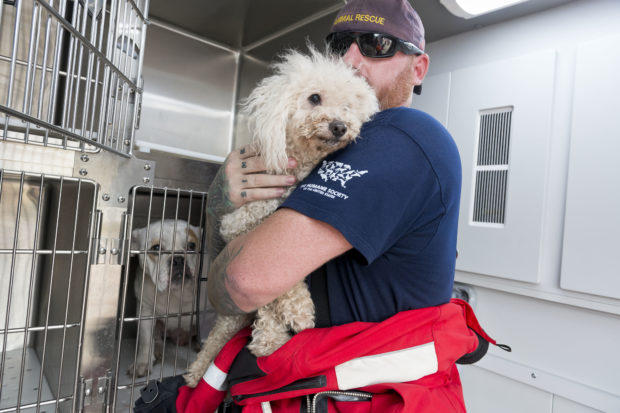
Our teams on the ground are assisting with assessments of damage and need, and with rescue efforts. Photo by Anthony Rathbun/AP Images for The HSUS
The broadcast images are telling.
A hovering Coast Guard helicopter lifts a family from a rooftop, 150 feet into the air, and then safely out of danger. The family includes a husband and wife couple in their late 50s or 60s and their two Boston Terriers, who seem to take the harrowing lift in stride.
A Federal Emergency Management Agency (FEMA) rescuer does an interview along with his search dog, who specializes in finding live victims of disasters. They’ve helped dozens of people, the dog going in first to find signs of life.
In this disaster, we are not fighting the federal government over the care of animals. Its agencies and responders are generally working to aid animal victims, too, and they’re even enlisting animals in the search and rescue efforts. The animals are victims, but in some cases, first responders are enlisting animals to help and they are part of the narrative of heroism.
That said, there’s more suffering than any of us can imagine, for both humans and animals. This is a terrible tragedy, playing out over a physical area larger than New Jersey. The region has been saturated with 25 trillion gallons of water. In Houston alone, the storm and the water releases have claimed more than 130,000 structures and counting.
When I went through Katrina 12 years ago, animal protection groups like The HSUS were the primary safety net for animals. Some first responders left animals behind. Shelters turned people with animals away. We fought with the government to focus some resources on the animal crisis.
Then and there, we vowed to change the legal framework to make sure that animals are not forgotten during disasters. We led the fight for the Pet Evacuation and Transportation Standards Act (PETS), and that law enacted in 2006 institutionalizes a concern for animals by local and state governments if they hope to get FEMA funds. The law is part of the explanation for the broader cultural awakening to the need to account for the needs of animals.
Today, on-the-ground participants in the disaster response – whether they are doing rescue, shelter, feeding, transportation, supply delivery, or some other essential task – recognize that animals count. They count because they are feeling individuals whose lives and safety matter, and they count because people affected by disasters care about them and love them.
Yesterday, we partnered with Wings of Rescue and GreaterGood.org to fly animals to Seattle. Today, we are working to fly animals to Oregon and also carrying out ground transport with Mutt Nation Foundation to a waystation at the Humane Society of Tulsa in Oklahoma. We are moving animals who were up for adoption prior to the hurricane from Dickinson and League City to our partners in Houston — the Houston Humane Society and Emancipet — who are serving as waystations. Tomorrow, we will again be working with our flight partners to transport animals to Maryland, Virginia, Pennsylvania, and Washington, D.C.
Meanwhile, our teams on the ground are assisting with assessments of damage and need, and with rescue efforts. We are continuing to make ourselves available to emergency management officials with animal needs in Southeast Texas. In Rockport, where the storm made landfall and where there is severe damage, the team did an assessment last night and is working to get supplies for unmet short-term and long-term needs.
The outpouring of generosity from so many Americans, and indeed from people throughout the world, has been uplifting. I assure you it heartens our team on the ground. And it fortifies our resolve to stay with the animals and the people of southeast Texas for the difficult months ahead, as the physical structures and daily routines are put back in place.
As we did with Katrina in Louisiana and Mississippi, and with Sandy in New York and New Jersey, we intend to leave the state of Texas stronger and better off in the aftermath of Harvey, when it comes to animal welfare.
P.S. If you can support this lifesaving work, please donate to our Disaster Relief Fund so we can answer the call when disaster strikes, now and in the future.
Text LOVE to 20222 to donate $10* to the Disaster Relief Fund or donate here»
*Message and data rates may apply. A one-time donation of $10 will be added to your mobile phone bill or deducted from your prepaid balance. Terms and conditions can be found at www.hmgf.org/t
The post HSUS disaster response expanding with rescues and transports appeared first on A Humane Nation.
Related Stories
- HSUS rescuers wade through Texas floods to save, evacuate animals
- The crisis in Texas, and the urgent call to help animals and people
- As Harvey menaces, HSUS team readies for pet evacuations, rescue
Enviroshop is maintained by dedicated NetSys Interactive Inc. owners & employees who generously contribute their time to maintenance & editing, web design, custom programming, & website hosting for Enviroshop.
